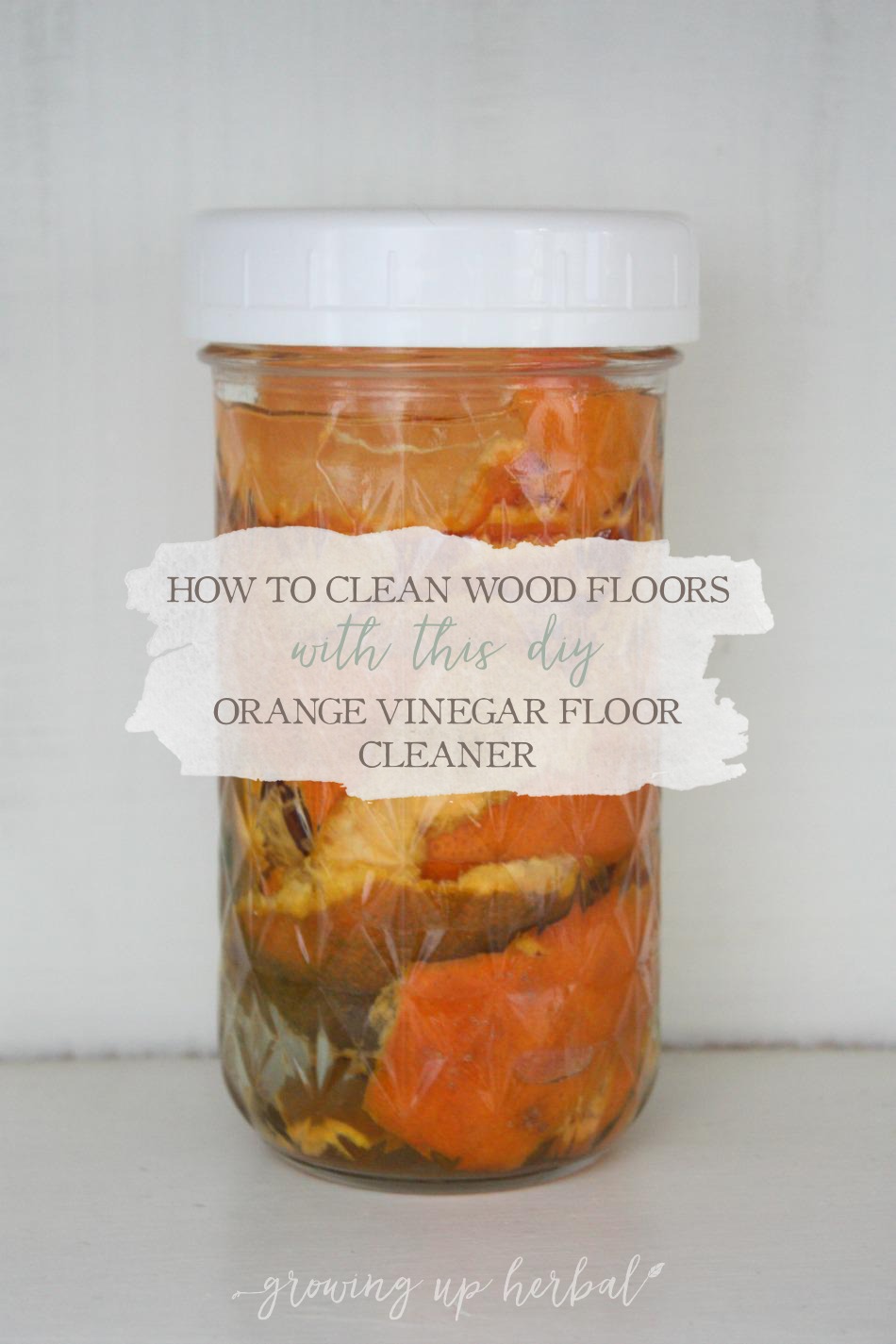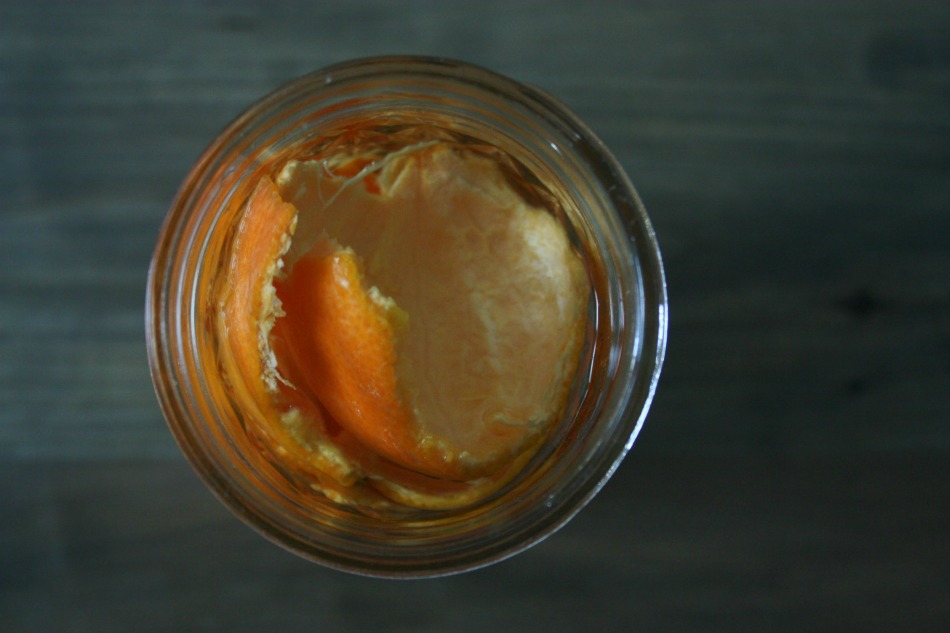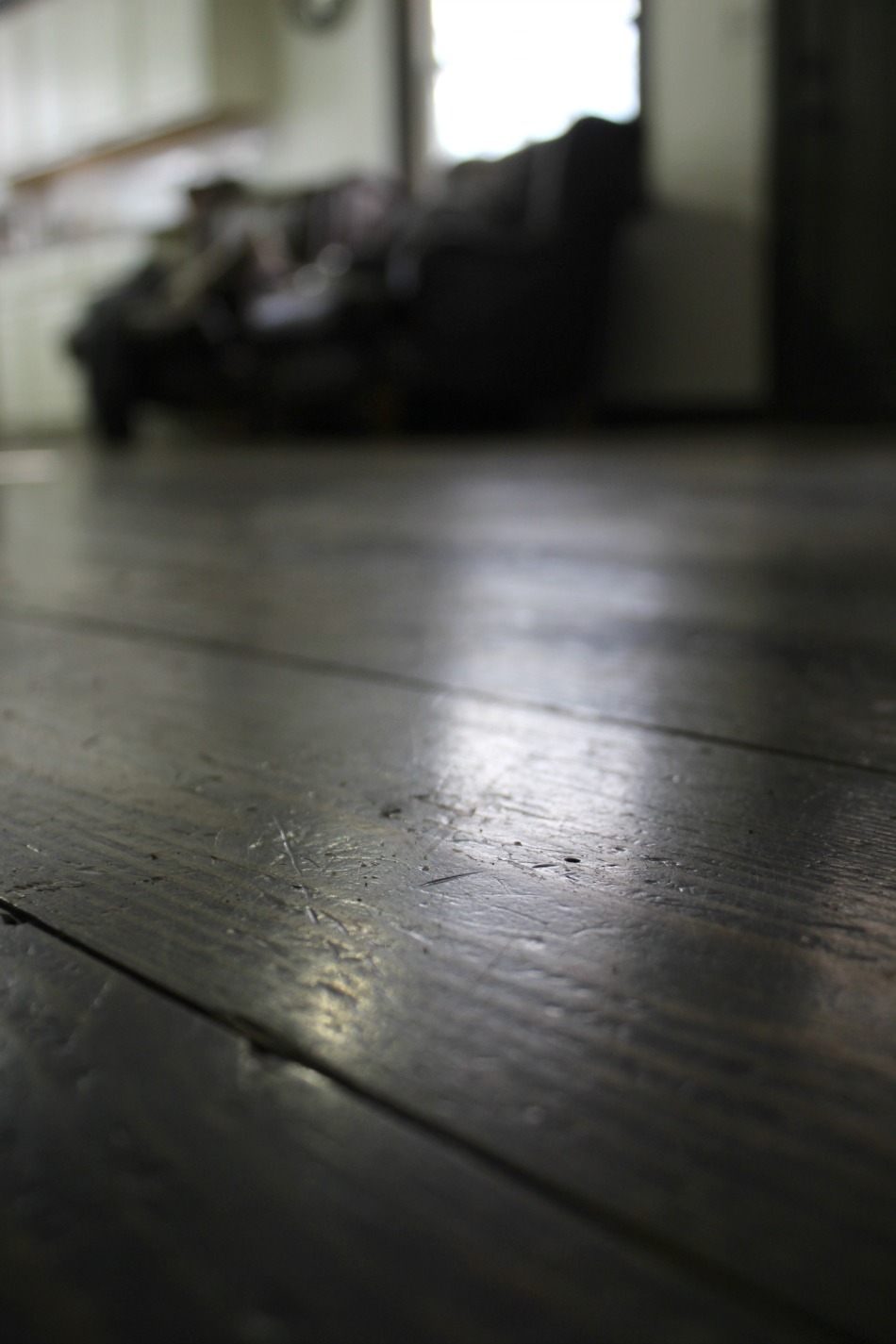
If you’re like me, you’re constantly cleaning your home, especially with pets and little kids running all around! And when it comes to the cleaners you want to use, you’re probably doing your best to use natural versions that are less toxic than the brand name ones you’ll find in most stores.
Now, in my home, natural is always the goal, but that doesn’t mean we always get there. Sometimes I choose what’s quick or more convenient because I’m busy or I don’t know another way, but when it comes to getting clean wood floors the natural way… now that’s a goal I can meet! Not only is it possible to clean wood floors naturally, but it’s quick, easy, and super cheap!
Today, I’m going to show you a simple way to make a DIY orange vinegar floor cleaner that cuts through dirt and grime, helps decrease germs, freshens your home, saves you money, and isn’t harmful to you or your family. I’m also going to share what I’ve learned about caring for wood floors, especially when it comes to using vinegar on them as that’s somewhat of a controversial topic among wood care experts.
Orange Vinegar Floor Cleaner
Making and using an orange vinegar floor cleaner is one of the simplest, safest ways to clean your floors. It cleans, it deodorizes, it’s non-toxic, and it’s cheap!
You’ll need:
- dried orange peel or fresh orange peel
- white vinegar
Directions:
- Fill your glass jar 1/3 full of dried orange peel (or full if using fresh peel). Top with white vinegar or apple cider vinegar, filling your jar 1-inch to the top.
- Put a plastic lid on the jar and place it in a kitchen cabinet to sit 1-2 weeks… shaking every 2-3 days if you can remember to do it.
- After a couple weeks, strain vinegar from orange peel. Compost your herbs, and reserve orange vinegar in a labeled glass jar. Don’t forget to start the process over when your orange vinegar is half gone!
To Use:
Once you’ve swept or vacuumed your floor well, add 1/2 cup of your orange vinegar floor cleaner to 2-quarts of room temperature water. Do not add essential oils to this mix as the oils will not mix with the water and will end up sitting on the top of your floor and can possibly damage the plastic components of your mop if you’re using a spray mop like I do.
Lightly spray your floor with this mixture and mop. Open the windows or turn on the fans in your home to help your floors dry quickly, and follow up with a nourishing oil if you choose to do this at this time.
How To Clean Wood Floors With Vinegar
This orange vinegar floor cleaner will work on all types of floors, but there are some cautions when using it on wood floors, although, in my opinion, these cautions can apply to all types of flooring.
So, first off, wood flooring needs 3 things.
- To stay clean
- To stay dry
- To stay sealed and nourished
Sweeping and Vacuuming
To care for your flooring, it’s important to keep your floors clean and free of dirt and grime as dirt acts as sandpaper and scratch or rub the finish off the flooring, leading to a dull look or deep scratches over time. Regular sweeping and vacuuming can help save your floors finish.
Mopping
Water will ruin a floor quicker than dirt so it’s important when you’re cleaning your floor to keep the water to a minimum when mopping it. My favorite way to mop is to use a mop that sprays a fine mist over the floor and has a microfiber cleaning cloth that can be removed and washed. Not only is the water minimized with these mops, but they save you money and help keep your floor cleaner as the microfiber picks up extra dirt left behind after sweeping or vacuuming.
This is the mop that I’m currently using on my wood floors.
Sealing and Nourishing
The last thing to keep in mind when it comes to caring for floors is to make sure they stay sealed. Most floors have a coating over the top to keep the wood free of dirt and moisture, but over time, this protective layer is rubbed away. You can minimize this by keeping your floors swept and mopped, and you can also refinish your floors ever so often if you’re up for it.
In our home, we designed our floors to have a rustic look and feel to them. After we put our wood in and sanded them smooth, my husband beat the floors with a chain, a hammer, nails, and anything else he could think of to dent and scratch it before we stained and sealed it. This gave us a nice weathered look, but life with four boys and a dog has weathered it even more. Thankfully, we’re okay with that, but because the sealant is wearing away from the floor, it does expose our wood to more dirt and water.
One of the things we do to nourish our floors is to oil them once or twice a year. There are various kinds of oil you can use to nourish the wood in your home, but the most common are coconut oil, linseed oil, tung oil, and jojoba oil. Each of these oils works well to soak into the wood and help it resist moisture. If you choose to do this to your wood floors (or furniture), be sure to purchase 100% pure oil (nothing with added solvents) and research which oil is the right fit for your color floor and your budget. I also like to add lemon or orange essential oil into whatever oil I’m using on my floor when I do this as it makes the whole house smell great! This step takes a little bit of work, but that’s can be a good thing! Your floors will look so nice, and it will be so good for them. If they could talk, they’d say, “Thank you!”
So there you go. A cheap and easy DIY orange vinegar floor cleaner that you can use to clean your wood floors safely.
Happy spring cleaning, friend!


How do you go about applying the nourishing oil to your wood floors? Do you use a rag and rub it while on your hands and knees?
Yes, Caitlin. It’s a big job which is why we only do it once or twice a year. You simply dab the oil on a rag and rub it in. The kids definitely help to speed the job up!
Hello Megan: Very nice article. I was wondering if it is strong enough to use it for cleaning the shower’s floor? (mosaic) … could it be used also to clean kitchen counters or vitroceramic kitchens? What about herbs replacing orange peels? I have a lot of herbs growing in my garden (sage, thyme, basil, parsley, tarragon, marjoram, lemon balm, mints, lemon grass) … but we don’t have oranges on a daily basis… Will herbs rot during the process?
Yes, Ali, you can use other herbs if you’d like. Many culinary herbs have antimicrobial properties, and they make a great addition to vinegar used for cleaning. You can use an herbal vinegar on any surface that vinegar is safe to use on. The herbs will wilt and decompose in the process, but once you strain them from the vinegar, you can throw them away. Hope this answers your questions!
Hey Ali – Once citrus season hits we eat tons of it and I just put the peels in the freezer to have on hand year round.
What a great idea, Katie! Thanks for sharing!
This stuff is SOOO amazing!!! I made my own orange vinegar a couple of weeks ago, and am due to make another batch because I’ve been using it for EVERYTHING! We’re in the midst of potty training my two year old, and this really helps get the smell out of the air fast when those number 2s land on the floor, hahaha!! Thanks for sharing <3
Awesome, Savannah! I can totally relate… we’re potty training my youngest right now so there are lots of accidents! Thanks for sharing!
[…] Found at Growing Up Herbal […]
[…] 21. Wood Floor Cleaner (aka Murphy Oil Soap): Fill mason jar 1/3 full of Dried Orange Peel + Top with Distilled White Vinegar + Let sit for 1-2 weeks (shaking occasionally) + Strain solution from peel || For full instructions: Growing Up Herbal […]
I made orange sage vinegar like, a year ago and stuffed it in the back of the pantry to brew. Aaaaand totally forgot about it. I should pull it out!
Oh, orange sage. That sounds lovely!
4.5